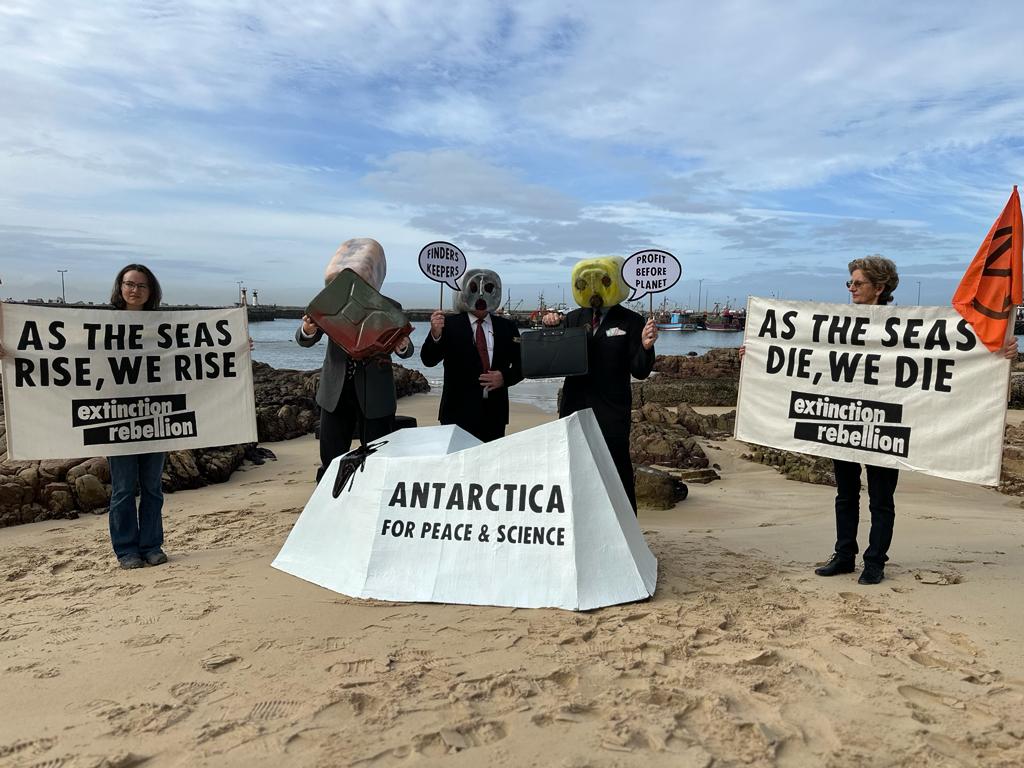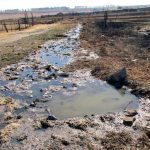45TH ANTARCTIC TREATY CONSULTATIVE MEETING
South African opposition escalates calls for government accountability on Russian Antarctic prospecting

National environmental authorities responsible for overseeing Antarctic interests are facing mounting pressure to address Russia’s self-declared oil and gas activities in the Southern Ocean. The issue was not discussed during the Antarctic Treaty Consultative Meeting in Finland, which concludes today, despite a historic climate focus on this year’s agenda.
Helsinki, Finland – Scientists and diplomats from more than 50 states, including South Africa, are meeting today (Thursday) for the final deliberations at the two-week Antarctic Treaty Consultative Meeting in the Finnish capital.
The impacts of tourism and climate change were among the issues discussed at the closed-door meeting, Finnish Polar Ambassador Tiina Jortikka told Daily Maverick at the meeting hall. But the ambassador confirmed that Russia’s controversial and ongoing search for oil and gas in Antarctica’s heat-threatened Southern Ocean had not been tabled by any country for discussion at the Finland-hosted meeting.
Yet, on Wednesday, the DA launched yet another challenge to Environment Minister Barbara Creecy’s persistent denials of these Russian activities – which have taken place annually via Cape Town for at least 25 years.
In recent parliamentary replies to opposition member Dave Bryant – who asked if Creecy’s department would “table the evidence of global experts” at the Helsinki meeting – the minister said that the Russian “prospecting” activities “remain unsupported by evidence”.
“Consequently, there is no requirement to present any materials or documents during the [meeting].” However, Creecy said the meeting provided a platform to reaffirm existing laws that banned Antarctic mining activities.
The minister said “there are existing legal structures that forbid mining activities in Antarctica”, such as the Madrid Protocol, which entered into force in 1998.
“South Africa has implemented this protocol, which aims to safeguard the Antarctic environment comprehensively and minimise the ecological consequences of human actions in the area,” she noted. “Additionally, there is presently a ban on mineral resource operations, including the exploration of hydrocarbons, in Antarctica. This ban has been in effect since 1977 and applies to all nations that are signatories of the Antarctic Treaty, including Russia.
“Therefore, no prospecting activities should be taking place in the Antarctica region,” said Creecy – echoing her February 2021 parliamentary replies to Bryant’s earlier set of questions.
Ban applies to all signatories, says Creecy
Antarctic mining activities have been prohibited for more than four decades – the ban was signed in 1991, and only formally entered into force at the end of the 1990s. But it was in “Recommendation IX-1 of 1977” that the majority of treaty countries, including Russia and China, agreed “to refrain from all exploration and exploitation of Antarctic mineral resources”.
Creecy told Bryant her department had no authority to stop vessels from docking in the ports of the republic.
Here, Creecy may be right – that authority is likely to rest with South Africa’s national transport and international relations authorities.
But the minister has yet to respond to extensive Russian state documents and scientific papers, which not only outline in exhaustive detail Moscow’s minerals vision for Antarctica, but also long-term intentions to exploit the sensitive region’s resources – that is, should the mining ban be revised around 2048.
Daily Maverick has consistently furnished her department with evidence since October 2021, seeking comment. We have also reported in a series of investigations on Kremlin-sanctioned seismic activities that have sailed through the Port of Cape Town almost yearly since at least 1998.
Russian state actors have told us their Southern Ocean search for oil and gas is scientific research that conforms to Antarctica’s current no-mining laws. But these assertions contradict statements made by the Kremlin’s mineral explorer, Rosgeo, which owns the seismic blaster – the Akademik Alexander Karpinsky. Conducting research on ice sheet dynamics and seabed geology, the Karpinsky is also responsible for claiming from Cape Town harbour that there are 500 billion barrels of oil and gas in the Southern Ocean.
To stitch together geological maps of the Southern Ocean, the ship deploys airguns associated with harm to marine life.
What is the Kremlin’s mineral explorer doing there?
Bryant, in a statement on Wednesday, hit back by saying Creecy’s latest Parliamentary replies, released last week, confirmed that the South African government “is opposed to alleged Russian energy prospecting in Antarctica… and reaffirmed that this long-standing ban also applies to Russia.”
Representing the DA’s forestry, fisheries and environment portfolio, Bryant wanted to know why the Kremlin’s state mineral explorer was in Antarctica if there was zero evidence of Russian prospecting in the region.
“The question has to be asked though: what then is Rosgeo, a Russian geological exploration group, doing in Antarctica and why are Russian exploration ships being allowed to dock in South African harbours?”
Bryant said the Antarctic “is a very delicate natural environment and any prospecting for energy resources in the area is completely banned. Any steps taken by Russia or any other country to prospect for resources in the area should be vehemently opposed by the South African government and should evidence emerge of prospecting by Russia, the ANC government would be compelled to take direct action, which would curtail the working relationships between South African and Russian scientists.”
A ‘forever’, unchangeable ban
On World Environment Day on Monday, 5 June, Extinction Rebellion staged a “performance protest” in the coastal Cape Town suburb of Kalk Bay, urging the South African government and other Antarctic Treaty countries to beef up the mining ban – which can be modified from 2048 should even one among the treaty’s present 29 consultative states call for a review.

Extinction Rebellion protesters during an ‘artivism’ performance in Kalk Bay, Cape Town, on World Environment Day. The group wants a new Antarctic mining ban that can never be changed. (Photo: Ethan van Diemen)
This could potentially expose Antarctica to environmentally destructive extraction in a globally important natural reserve, the group says. Based on advice from the International Energy Agency, excavating new oil and gas would further retard lagging efforts to reduce CO2 emissions and keep the planet within liveable boundaries. Humanity had to limit global temperature rise to 1.5°C above pre-industrial levels.
“We are calling on the delegates who are currently meeting in Finland to support this proposal to make any type of mining impossible – to close the door on that entirely. We want a ‘forever ban’ on mining in Antarctica,” Extinction Rebellion said, while posing as cynical oil executives on the Kalk Bay waterfront.
The “artivism” performance – like the group’s other ongoing protests against Russia’s Antarctic activities this year – made international headlines this week.
Together with 28 other South African groups, including Greenpeace volunteers in Cape Town, Extinction Rebellion has also sent a letter of demand to the South African government, asking it to block the passage of Russian ships involved in questionable activities, and to pursue a “forever ban”.
Cape Town mayor: ‘Privatise’ ports
Meanwhile, Cape Town mayor Geordin Hill-Lewis, also a member of the opposition, called for the privatisation of South African ports this week. He was speaking at Ports and Customs Week as well as Border Security Week, saying that privatisation was the answer to what he described as poorly managed port infrastructure by the national government.
Although Hill-Lewis did not refer to Russian vessel activities during his privatisation call, earlier this year he expressed his frustration over the passage of Russian state vessels through Cape Town.
“Russian state vessels should not be here,” Hill-Lewis told us. He happened to be relaunching the port city as an Antarctic gateway destination.
“All of these Russian war exercises, and the meetings with Russian government ministers, are a shameful moral disgrace,” said Hill-Lewis, but he said the ports “are managed by national government and therefore the City has no control over the vessels which dock there”.
Bryant added: “It is now essential that any evidence relating to illegal prospecting in the region be provided urgently so that action can be taken to prevent any illegal prospecting from taking place. The ban on prospecting in Antarctica has been in place since 1977 and no country should be exempt.”
For her part, Jortikka – Finland’s most senior polar official – told Daily Maverick that Antarctica’s existing ban laws appeared adequate but that she nevertheless expected the meeting to reaffirm them in the so-called Helsinki Declaration. This document would symbolise the outcomes of the historic treaty’s first-ever full-day session focused on climate change.
South Africa is ‘committed’ to Madrid Protocol
The South African delegation, present in Finland, did not join Russia in giving a standing ovation during the meeting’s opening ceremony for a youth climate activist.
They have also declined the reporter’s request for an interview about issues discussed at the closed-door meeting, which only allowed Daily Maverick into the main event during the opening ceremony.
However, responding to our questions, acting communications director Peter Mbelengwa reiterated Creecy’s parliamentary replies.
“The Department of Forestry, Fisheries and the Environment remains committed to upholding the environmental preservation and protection measures outlined in the treaty and its associated protocols,” said Mbelengwa. “We urge all signatory nations to maintain their dedication to this agreement and join us in striving for the long-term sustainability of this unique and fragile ecosystem.” DM
Tiara Walters is a full-time reporter for Daily Maverick’s Our Burning Planet unit. Walters’s travel to Helsinki has been made possible, in part, by the support of the Friedrich Naumann Foundation and the Finnish Embassy of South Africa.




















 Become an Insider
Become an Insider
Comments - Please login in order to comment.